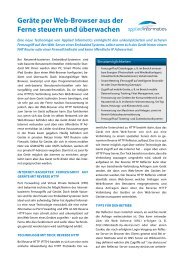Designing and Building Portable Systems in C++ - Applied Informatics
Designing and Building Portable Systems in C++ - Applied Informatics
Designing and Building Portable Systems in C++ - Applied Informatics
You also want an ePaper? Increase the reach of your titles
YUMPU automatically turns print PDFs into web optimized ePapers that Google loves.
This is what one would <strong>in</strong>tuitively expect, assum<strong>in</strong>g left-to-right argument evaluation.<br />
Compiled with HP ANSI <strong>C++</strong> A.03.57 on HP-UX 11.11, the result is the same. However,<br />
when compiled with Compaq <strong>C++</strong> 6.5 on HP Tru64 5.1, the program yields:<br />
a = 0, b = 0, c = 0<br />
which may be surpris<strong>in</strong>g. However, with regard to the <strong>C++</strong> st<strong>and</strong>ard, both results are correct.<br />
Firstly, the compiler is free to evaluate the function arguments <strong>in</strong> any order it likes – from left<br />
to right, from right to left, <strong>in</strong> order of decreas<strong>in</strong>g expression complexity, or even <strong>in</strong> r<strong>and</strong>om<br />
order. Secondly, the compiler is free to delay the <strong>in</strong>crement operation until all arguments have<br />
been evaluated.<br />
2.1.3 Language Extensions <strong>and</strong> Syntactical Freedom<br />
Especially Microsoft Visual <strong>C++</strong> has many “features” that make writ<strong>in</strong>g portable code<br />
unnecessarily hard for developers not pay<strong>in</strong>g enough attention to correct syntax. There is a<br />
compiler sett<strong>in</strong>g to turn off language extensions, but with this sett<strong>in</strong>g enabled, one can no<br />
longer use the W<strong>in</strong>dows Platform SDK, as its header files rely on non-st<strong>and</strong>ard language<br />
features. The most common problem cases are presented below.<br />
Method declarations<br />
The follow<strong>in</strong>g class def<strong>in</strong>ition is valid <strong>in</strong> Microsoft Visual <strong>C++</strong>, but causes errors on<br />
st<strong>and</strong>ards conformant compilers.<br />
Class A<br />
{<br />
void A::m();<br />
};<br />
In this example, the class name is part of the method declaration, which is both redundant <strong>and</strong><br />
not allowed by the st<strong>and</strong>ard. Mistakes of this k<strong>in</strong>d happen very easily if a class is extended<br />
with a new method. The developer starts by implement<strong>in</strong>g the new method <strong>in</strong> the<br />
implementation file, <strong>and</strong> then adds the correspond<strong>in</strong>g method declaration to the header file by<br />
copy-<strong>and</strong>-paste, forgett<strong>in</strong>g to remove the class scope from the declaration. The code compiles<br />
f<strong>in</strong>e with Microsoft Visual <strong>C++</strong>, but compilers that are more str<strong>in</strong>gent will produce error<br />
messages when be<strong>in</strong>g given such code.<br />
Po<strong>in</strong>ters to members<br />
Microsoft Visual <strong>C++</strong> allows a simplified syntax for pass<strong>in</strong>g po<strong>in</strong>ters to member functions.<br />
The follow<strong>in</strong>g class declaration def<strong>in</strong>es a po<strong>in</strong>ter to a method of B tak<strong>in</strong>g no arguments, as<br />
well as methods us<strong>in</strong>g this po<strong>in</strong>ter type.<br />
Class B<br />
{<br />
public:<br />
typedef void (B::*M)(); // po<strong>in</strong>ter to a method of B tak<strong>in</strong>g no<br />
args<br />
void <strong>in</strong>voke(M m);<br />
void do();<br />
void test();<br />
};<br />
The methods <strong>in</strong>voke() <strong>and</strong> do() can be implemented as follows:<br />
void B::<strong>in</strong>voke(B::M m)<br />
{<br />
(this->*m)();<br />
}<br />
5








